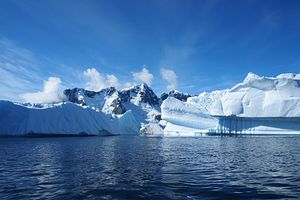China hosted the 40th Antarctic Treaty Consultative Meeting in Beijing from May 22 to June 1, the first time the meeting was held in China. During the meeting, the State Oceanic Administration released the White Paper “China’s Antarctic Activities.. Meanwhile, a number of high level Chinese officials, including Vice Premier Zhang Gaoli, State Councilor Yang Jiechi, and Vice Minister of Foreign Affairs Zhang Yesui all delivered speeches setting out China’s position on Antarctic issues. China promised to invest more research in Antarctica, reaffirmed strong support of the Antarctic Treaty System (ATS), and hosted a special meeting on the balance between protection and use in the Antarctic.
The meeting provides an opportune moment to examine China’s changing role in Antarctica.
What Does China Want From Antarctica?
China’s expanding global interests and influence in combination with domestic need for resources mean that Antarctica is increasingly on China’s radar. China’s Antarctic expeditions, however, date back to the 1980s. Initially, national pride was at the core of Chinese activities in the Antarctic. When China began reengaging with the rest of the world in 1978, proving that Chinese could even reach the remotest part of the world was very inspiring for Chinese people. Most of them had never been abroad then.
Since the establishment of the first Antarctic Station (the Great Wall Station) in 1985, China’s interests in the Antarctic have evolved from symbolic to substantial. Scientific understanding of the Antarctic continent and Southern Ocean has become China’s focus. China realizes that Antarctica plays a key role in global climate change; Antarctica is also a new frontier of environment and natural resources for human development. That said, it would be wrong to assume that China will start mining in Antarctica in the foreseeable future. China ratified the Protocol on the Environmental Protection to the Antarctic Treaty (Madrid Protocol) in 1994. China is therefore committed to the mining ban in Antarctica during the lifetime of the Madrid Protocol.
Chinese interests in the Antarctic have diversified in recent years. Antarctic tourism is more and more popular among China’s rich and growing middle class. In 2016, Chinese tourists comprised the second largest group of visitors to the Antarctic Peninsula, second only to Americans. It is expected that as long as the Chinese economy continues to grow, so too will the Antarctic tourism market. At the same time, fisheries in the Southern Ocean and bioprospecting are attracting Chinese attention.
How Will China Achieve Its Antarctic Interests?
China’s scientific capacity in the polar regions has improved rapidly. This is demonstrated in China’s 33 Antarctic expeditions between 1984 and 2016 and the construction of four research stations (Great Wall, Zhongshan, Taishan, and Kun lun/Dome A). In 2016, China’s first fixed wing aircraft in the Antarctic, Xue Ying 601, was put into service. This greatly enhanced the logistical capacity of Chinese Antarctic expeditions. China is now building its second icebreaker and a fifth research station on the Ross Sea Ice Shelf.
In the 13th Five-Year Plan of the National Economic and Social Development of China (2016-2020), a major program exploring the polar regions was announced (Xue Long Tan Ji). This growing scientific capacity will help China better understand Antarctica and strengthen the Chinese presence in the region, while supporting China’s ambition to become a significant player in Antarctic governance.
In January 2017, Chinese President Xi Jinping stated at the United Nations Office in Geneva that the deep seabed, polar regions, outer space, and the internet are new frontiers for international cooperation. Chinese diplomacy in these fields has also increased noticeably in recent years. It must be pointed out, however, that after engaging with the international system for over four decades, China’s role in international diplomacy has shifted from one of follower to that of a key player. As a late-comer to the Antarctic Treaty System, China is now more and more proficient at playing a part in the System. For example, China has been making efforts in promoting the establishment of Dome A and Kunlun Station Antarctic Specially Managed Areas (ASMA) in the Antarctic Treaty Consultative Meeting. This would be an interesting case to test Chinese diplomacy in shaping Antarctic governance.
What Does a Rising China Mean for Antarctic Governance?
The Antarctic Treaty was established after World War II and can be seen as part of global arrangement between the two superpowers at the time – the United States and the Soviet Union. Since then, however, the world has witnessed significant geopolitical change, not least the rise of China. An active and sometimes affirmative China would encroach on the “comfort zone” of incumbents in the Antarctic Treaty System. This means existing powers in the ATS would have to pay more attention to Chinese concerns and further collaborate with their Chinese counterparts. On the other hand, China’s rise in Antarctica will require China to take more responsibility in the region, such as conducting search and rescue operations, providing more research funding for international scientific cooperation, and contributing to capacity building of other developing countries’ Antarctic affairs.
In short, it is highly unlikely that China will abandon the Antarctic Treaty System in the foreseeable future. Although China has yet to publish its Antarctic policy, China has reiterated many times, including in its recent White Paper that the stability of the ATS will be enshrined. The ATS does, however, have to be resilient and evolve in the era of Anthropocene. It is expected that China will play an important part in the evolution of the ATS, trying to shape the development of the ATS for its national interests.
Nengye Liu is a senior lecturer at Adelaide Law School, University of Adelaide, Australia.
































